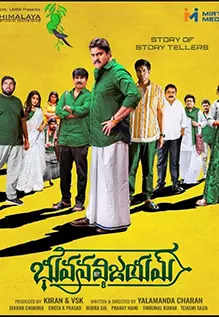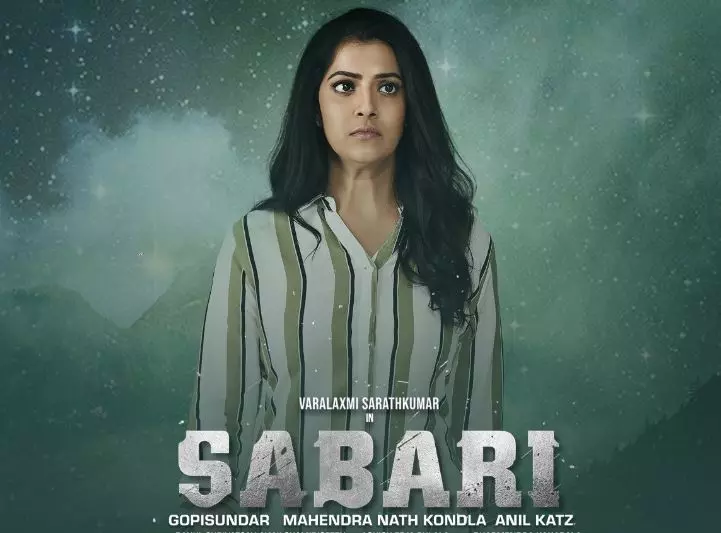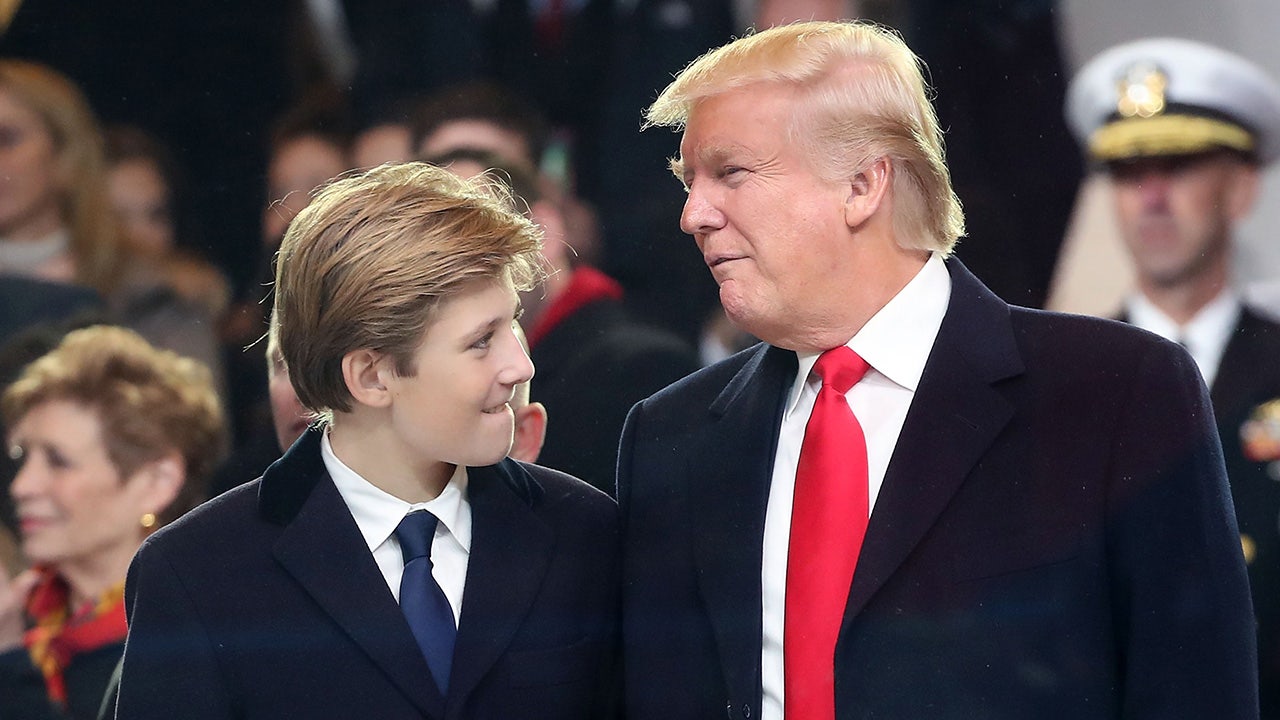Movie Reviews
Bhuvana Vijayam Movie Review: A comedy thriller which works in parts

Review: Right at the movie’s beginning, the voiceover and text on the screen say, ‘It’s the story of god in every man! It is the story of a man in every god!’ hinting at a story laced with mythology as 2D sketches narrate the 30-day backstory beginning at the entrance of Bhuvar-loka. Written and directed by Yalamanda Charan, the film tries to present unique content which falls somewhere in the region of a dramatic comedy thriller.
The two messengers, along with the soul of Yadagiri, arrive at Chalapathi’s office only to find chaos. However, the scriptwriters, played by Prithvi Raj, Srinivas Reddy, Sonia Chowdary, Snehal Kamat, and Viva Harsha (a thief disguised as a writer) who are put in a conference room arguing over their stories, create drama and humour.
Sunil, as Feeling Star, is a popular actor who suffers a head injury during a shoot and keeps forgetting people and events. While he manages to make the audience laugh, makers could have written his parts better to use his talent. Vennela Kishore, on the other hand, plays a mentally ill person who escapes from the facility. His non-verbal character indeed provides some rib-tickling moments, especially in combination with Viva Harsha, who also gets to play a meaty role. The movie is full of nuanced and seasoned artistes, and they do deliver. Goparaju Ramana got into the skin of the character playing an honest film producer. The supporting actors include Vasanthi Krishnan, Raj Tirandasu, Shaking Seshu and Sattipandu. The subplot of a driver who turns into a writer to save his child invokes some emotion.
With a more engaging screenplay, fewer continuity issues and trimming of unwanted clutter, the film would have transcended into a memorable one with unique content. The film has music by Shekar Chandra, cinematography by Sai and editing by Chota K Naidu.
While the film has an intriguing premise, the execution leaves much to be desired. Nevertheless, it is what it is, a dramatic comedy thriller with decent production values and a talented cast that works in parts.

Movie Reviews
Unfrosted Movie Review: A sweet origins film which borders on the saccharine

Unfrosted opens with Jerry Seinfeld’s character, Bob Cabana, as he tells a young boy the fantastical tale of how Pop-Tarts were invented. We then warp back to the 1960s, a time when breakfast belonged solely to Kellogg’s and Post, locked as they are in a comical rivalry. This high-stakes competition pushes both companies to create the next breakfast revolution, resulting in the birth of the iconic Pop-Tart – and its lesser-known competitor, Post’s Country Squares.
Unfrosted is a heavily fictional reimagining of how the Pop-Tarts were invented. It is so fictional that the film even teases that one of the experiments led to the birth of a sea-monkey (brine shrimp) ravioli-like creature. Seinfeld throws in a ton of wacky historical cameos, taking some creative liberties with the past for laughs. At a point, the film teases that people like Jack LaLane, professional fitness coach, Steve Schwinn, founder of the Schwinn bicycle company, and Tom Carvel, who invented soft ice cream, were brought together to make the Pop-Tarts.In a lighter moment, McCarthy’s Donna suggests that even Albert Einstein could have been involved in the invention, if not for his passing. Seinfeld’s playful use of historical figures and his signature humour bring some hilarious punches. However, some political references and character cameos might fly over the heads of those unfamiliar with American history. The head-scratching could get in the way of the comedy.
Movie Reviews
‘The Image of You’ review: Style over substance in the best way

Identical twins with opposite personalities are as big a part of thrillers as creepy kids are to horror. And if a romantic interest gets involved, the story becomes even more twisted. The Image of You follows Anna and Zoe (Sasha Pieterse, Pretty Little Liars), twin sisters who are close, but nothing alike. When Anna meets charismatic stock broker Nick (Parker Young, Call Me Kat), she thinks is perfect. Zoe is not so trusting and is determined to find out if he is really as great as he seems to be.
Erotic thrillers are at their best when the focus is teasing the audience. That is certainly the case with The Image of You. The film provides plenty of titillating moments and sexy lingerie. Pieterse and Young have the smoldering looks and chemistry to make sure that anyone watching never looks away. It is a throwback to the halcyon days when the genre ruled late night cable.
It really should not work. The plot is too derivative, the constant split screen is distracting, and the mystery lacks any tension. Yet, everything comes together thanks to some outrageous twists and the film’s willingness to never take itself too seriously. The Image of You is very much a case of style of substance, and it knows it.
While there are outliers, sex scenes in movies have decreased dramatically. Once a right of passage for teenagers, erotic thrillers have all but disappeared. The Image of You will not be the start of a resurgence of either, but it does stand out in today’s more sterile cinematic landscape. It is the type of entertaining fluff there is not enough of anymore.
The Image of You is out now on digital
Join the AIPT Patreon
Want to take our relationship to the next level? Become a patron today to gain access to exclusive perks, such as:
- ❌ Remove all ads on the website
- 💬 Join our Discord community, where we chat about the latest news and releases from everything we cover on AIPT
- 📗 Access to our monthly book club
- 📦 Get a physical trade paperback shipped to you every month
- 💥 And more!
Movie Reviews
“Kingdom of the Planet of the Apes”: Disney's New Kingdom is Far From Magical (Movie Review)

Nearly sixty years removed, it is perhaps all too easy to forget just how radical of a work Franklin J. Schaffner’s original “Planet of the Apes” truly was. In adapting Pierre Boulle’s “La Planète des singes” novel into a feature film, Schaffner and co. maintained the book’s hard science-fiction intellectualism while also infusing it with a radical counterculturalism that resonated so deeply with younger audiences of the time. The resulting film often plays like a feature-length “Twilight Zone” episode in the best of ways, balancing more traditionally thrilling action sequences out with headier diatribes on the human condition, and fittingly so, seeing as it was co-written by Rod Serling himself.
After decades of sequels and one sensationally ill-advised attempt at a Tim Burton-helmed remake in 2001, the “Planet of the Apes” franchise half-stumbled into something remarkable in the 2010s. While “Rise of the Planet of the Apes” was a critical and commercial success, it wasn’t until that film’s sequel, “Dawn of the Planet of the Apes,” that a new legacy was truly cemented, with the addition of writer-director Matt Reeves. Reeves’ films, “Dawn” and “War for the Planet of the Apes,” brought a raw and immediate emotionality to the work that, when paired with similarly excellent elements such as Andy Serkis’ phenomenal lead performance and Michael Giacchino’s decadent musical score, truly brought “Planet of the Apes” to a new generation. In many ways, just as Schaffner’s 1968 film reflected the fears and anxieties of its era and spoke directly to audiences of the day in primal form, so too did Reeves’ films for modern audiences of the 2010s.
It is into this legacy that Wes Ball’s quasi-sequel/quasi-reboot/quasi-legacy-sequel, “Kingdom of the Planet of the Apes,” enters. And while Ball’s film is perfectly functional, competent, and resplendent in its technical achievements, “Kingdom” spends its entire runtime shouldering the burden of the franchise’s history, to its own detriment.
5. WEAK SPOT: THE OPENING
It truly cannot be overstated what a colossal misstep “Kingdom of the Planet of the Apes” takes in its literal opening frames. Opening on the deathbed and funeral pyre of Andy Serkis’ Caesar from the previous trilogy, surrounded by characters from those films, “Kingdom” delivers a fond farewell to these characters and drops its title card, right before hard cutting to a full 300 years later. This is so bizarre for so many reasons (the in-film ‘many generations later’ text is laugh-inducing) but chief among them is that it actively works to put distance between the audience and Noa, the primary character of this film.
Noa doesn’t know who Caesar was and is going to spend the next two-and-a-half hours of runtime finding that out as well as hearing apes debate over Caesar’s teachings and legacy. So opening with Caesar on his deathbed, surrounded by characters who mean nothing to this film, is indulgent at best and detrimental at worst. It prioritizes a quick dopamine hit of nostalgia that serves no purpose over the audience’s actual connection to the present-tense characters and story.
4. THOSE MONKEYS THOUGH
The visual effects, spearheaded by the fantastic team at Wētā FX, continue to be absolutely incredible here. With each successive film in the previous trilogy, the bar was raised for exactly how authentically a human actor’s performance could be translated to the face of a digital ape. “Kingdom of the Planet of the Apes” proudly continues this tradition, allowing its actors’ performances to truly shine through the digital augmentation.
In addition to this, the ape-on-ape action sequences are well-staged here, especially an early one that kicks off Noa’s Campbellian hero’s journey. There’s a visceral quality to the speed and momentum with which the Apes move, which is a fantastic blend of human movement and digital enhancement from Wētā FX. Furthermore, there’s a ton of little details throughout “Kingdom of the Planet of the Apes” that Wētā FX gets precisely right in fascinating ways, specifically in regards to artifacts and artifice of the camera and how the apes look within the frame. The delicate way in which focus shifts occur, the way lens flares react through this digital interface—it’s all exquisitely well-constructed.
3. WEAK SPOT: REHASHING
Director Wes Ball has spoken a lot about how “Kingdom of the Planet of the Apes” takes place 300 years after “War” to introduce audiences to an “Apes” world with exciting new story possibilities. In theory, that sounds perfect for a franchise running for nearly sixty years. However, in execution, that’s not at all what “Kingdom of the Planet of the Apes” delivers.
For many Fox-owned properties, the Disney acquisition has led to surprisingly passionate and off-the-wall new films: Dan Trachtenberg’s “Prey,” Arkasha Stevenson’s “The First Omen,” etc. But “Kingdom” doesn’t feel like a passion project brought to fruition; it feels more like Disney looked at a spreadsheet and realized “Planet of the Apes” was among the most consistently profitable franchises in their new stable and commissioned a new one regardless. Instead of new ideas or stories, “Kingdom” mostly rehashes things audiences have seen before in this franchise.
The sheer number of beats and story ideas that feel recycled, in whole or in part, from either “Dawn of the Planet of the Apes” or Schaffner’s original “Planet of the Apes” is staggering. Even the film’s attempt at an emotional, stakes-heightening climax sets up more conflicts we’ve already seen. Despite the lip-service to paving the way for new stories, “Kingdom” feels like someone shuffled their “Planet of the Apes” greatest hits playlist, and this is what we got.
2. THE HOOK OF RELIGIOUS THEMING
The film’s most intriguing concept is treating Caesar like ape Jesus, despite the absurdity of the notion.
By exploring the idea that Caesar’s ancient teachings have been distorted over centuries to serve the agendas of those with darker motives, “Kingdom” stumbles upon fertile creative territory. Like previous entries in the “Planet of the Apes” franchise, the film has the potential to offer a unique commentary on its contemporary era.
In today’s polarized American society, we witness manipulative figures weaponizing religious texts for personal gain. The antagonist, Proximus Caesar, and his cohorts seem poised to symbolize this phenomenon, offering the beginnings of a pointed allegorical critique.
1. WEAK SPOT: A FAILURE TO ENGAGE WITH SAID THEMING
“Kingdom” initiates an intriguing premise but fails to delve deeper into its potential. While it deserves recognition for introducing this captivating concept, the film disappointingly fails to explore it meaningfully, merely skimming the surface.
As the narrative unfolds, this deficiency becomes more apparent, culminating in a final conflict that feels rushed and disconnected from the central themes. Despite feeble attempts to link the religious motif with human involvement, it devolves into mundane ape versus human conflict, devoid of substance or relevance to the overarching theme.
(C)
“Kingdom” misses a golden opportunity to parallel Caesar’s legacy with that of the “Planet of the Apes” franchise itself. The potential for a poignant reflection on how messages can be distorted over time, akin to the franchise’s impact on generations of audiences, remains largely unexplored. Instead, the film succumbs to repetitive storytelling, recycling familiar tropes and narratives without self-awareness or innovation.
In essence, “Kingdom of the Planet of the Apes” falls victim to its own lack of originality, mirroring the very phenomenon it could have examined critically.
-

 News1 week ago
News1 week agoPolice enter UCLA anti-war encampment; Arizona repeals Civil War-era abortion ban
-

 News1 week ago
News1 week agoSome Florida boaters seen on video dumping trash into ocean have been identified, officials say
-

 Education1 week ago
Education1 week agoVideo: President Biden Addresses Campus Protests
-

 World1 week ago
World1 week agoUN, EU, US urge Georgia to halt ‘foreign agents’ bill as protests grow
-

 World1 week ago
World1 week agoEuropean elections: What do voters want? What have candidates pledged?
-

 World1 week ago
World1 week agoIn the upcoming European elections, peace and security matter the most
-

 Movie Reviews1 week ago
Movie Reviews1 week agoSabari Movie Review: Varalaxmi Proves She Can Do Female Centric Roles
-

 Politics1 week ago
Politics1 week agoAustralian lawmakers send letter urging Biden to drop case against Julian Assange on World Press Freedom Day
















